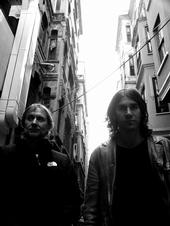While out on tour, Ilhan Ersahin found himself in a jam with French trumpet player Erik Truffaz. Each one having heard the other’s music on record through a mutual friend, they knew that they had similar sensibilities. Live, the two clicked immediately. They decided to record a few sessions together, bringing in Thor Madsen, guitar player for Wax Poetic; Jochen Rueckert, drummer for Wax Poetic and abstract electronics genius; and Matt Penman, a young Australian bass player. After two days of recording, Ilhan and Thor spent two years cut and pasting pieces of the recording together coming up with Our Theory, an album that hints at Miles Davis circa ‘In A Silent Way,’ and more modern jazz influences along the lines of Skalpel and Triosk with Jan Jelinek.
Ilhan Ersahin is the founder of both Wax Poetic and nublu—both the record label and the club. Growing up partly in Sweden and partly in Turkey, it is not surprising that his musical leanings are indefinable. Growing up a saxophone player, he forged a career in the jazz scene in New York, starting in the eighties. As DJ culture and electronic music began to flourish in the nineties, his ears opened, and he was drawn away from more formal compositions and improvisation into a sound more influenced by the ghettoes of Bristol, England and the underground warehouse parties of the then-still-dangerous alphabet city. By the time he opened nublu in 2002, his style had evolved into something that only slightly resembled jazz. When asked about his influences, Ilhan has said, “There’s the nightlife mixed with studio life, DJ life [has gotten] into our compositions because everywhere we play there are always electronics and DJs... It’s the culture now, it is really a part of everything. I am just trying to live in the moment, in what is now.â€
Erik Truffaz was born in 1960 in France. Growing up on the border between France and Switzerland, he learned music from the age of six, concentrating on brass instruments and from the age eight sometimes played with his father’s dance band with the trumpet, which eventually became his instrument of choice. The trumpet ultimately led him to a career as the leading avant garde player of the horn in France, as an artist on Blue Note. His music has been influenced heavily by electronics and sampling, and he has a specific affinity for live drum and bass. “The music that I try to play and to compose is a mix... it's a kind of mix between drum and bass, and jazz. I keep the rhythm of the drum and bass, dub, and I write some tunes with beats… so what I am doing is like with jazz music, always they take some tunes from Broadway and after, they mix it for improvisation. It’s not very different. The difference in bebop is they bring some tunes from 1930, 1940 - and I take what I hear now.â€
What they are hearing now is the future and the past all at once. Our Theory shows reverence for the past, being recorded in a live session entirely. But then the past is augmented with the future: samples from turntables are slipped between loops and cut up pieces of the original sessions that the five musicians recorded together. The result is a new take on not just jazz—but music. It is ‘Our Theory.’
